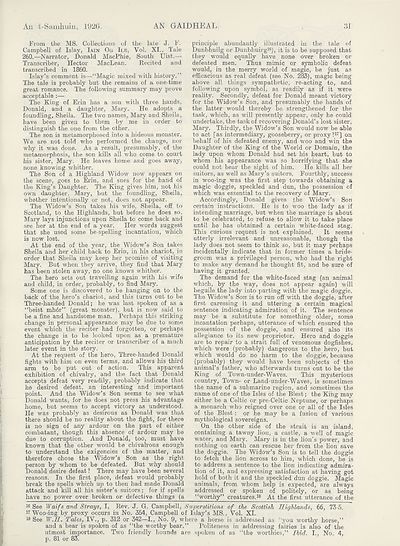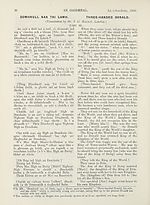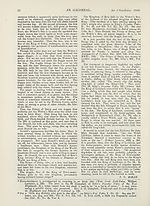An Comunn Gàidhealach Publications > Gaidheal > Volume 22, October 1926--September 1927
(39) Page 31
Download files
Complete book:
Individual page:
Thumbnail gallery: Grid view | List view

An t-Samhuin, 1920.
AN GAIDHEAL
31
From the MS. Collections of the late J. F.
Campbell of Islay, Iain Og Ile, Vol. XL, Tale
260.—Narrator, Donald MacPhie, South Uist.—
Transcriber, Hector MacLean. Recited and
transcribed in 1860.
Islay’s comment is—“Magic mixed with history.”
The tale is probably but the remains of a one-time
great romance. The foliowring summary may prove
acceptable :—
The King of Erin has a son with three hands,
Donald, and a daughter, Mary. He adopts a
foundling, Sheila. The two names, Mary and Sheila,
have been given to them by me in order to
distinguish the one from the other.
The son is metamorphosed into a hideous monster.
We are not told who performed the change, nor
why it was done. As a result, presumably, of the
metamorphosis, the son kills all who come to court
his sister, Mary. He leaves home and goes away,
none knowing whither.
The Son of a Highland Widow now appears on
the scene, goes to Erin, and sues for the hand of
the King’s Daughter. The King gives him, not his
own daughter, Mary, but the foundling, Sheila,
whether intentionally or not, does not appear.
The Widow’s Son takes his wife, Sheila, off to
Scotland, to the Highlands, but before he does so,
Mary lays injunctions upon Sheila to come back and
see her at the end of a year. Her words suggest
that she used some be-spelling incantation, which
is now lost.
At the end of the year, the Widow’s Son takes
Sheila and her child back to Erin, in his chariot, in
order that Sheila may keep her promise of visiting
Mary. But when they arrive, they find that Mary
has been stolen away, no one knows whither.
The hero sets out travelling again with his wife
and child, in order, probably, to find Mary.
Some one is discovered to be hanging on to the
back of the hero’s chariot, and this turns out to be
Three-handed Donald; he was last spoken of as a
“beist mh6r” (great monster), but is now said to
be a fine and handsome man. Perhaps this striking
change in personal appearance may be due to some
event which the reciter had forgotten, or perhaps
the change is to be looked upon as a premature
anticipation by the reciter or transcriber of a much
later event in the story.
At the request of the hero, Three-handed Donald
fights with him on even terms, and allows his third
arm to be put out of action. This apparent
exhibition of chivalry, and the fact that Donald
accepts defeat very readily, probably indicate that
he desired defeat, an interesting and important
point. And the Widow’s Son seems to see what
Donald wants, for he does not press his advantage
home, but seems to accept victory as understood.
He was probably as desirous as Donald was that
there should be no reality about the fight, for there
is no sign of any ardour on the part of either
combatant, though this absence of ardour may be
due to corruption. And Donald, too, must have
known that the other would be chivalrous enough
to understand the exigencies of the matter, and
therefore chose the Widow’s Son as the right
person by whom to be defeated. But why should
Donald desire defeat ? There may have been several
reasons. In the first place, defeat would probably
break the spells which up to then had made Donald
attack and kill all his sister’s suitors; for if spells
have no power over broken or defective things (a
principle abundantly illustrated in the tale of
Dunbhuilg or Dunbhuirg16), it is to be supposed that
they would equally have none over broken or
defeated men. Thus mimic or symbolic defeat
would, in the merry world of magic, be just as
efficacious as real defeat (see No. 283), magic being
above all things sympathetic, re-acting to, and
following upon symbol, as readily as if it were
reality. Secondly, defeat for Donald meant victory
for the Widow’s Son, and presumably the hands of
the latter would thereby be strengthened for the
task, which, as will presently appear, only he could
undertake, the task of recovering Donald’s lost sister,
Mary. Thirdly, the Widow’s Son would now be able
to act [as intermediary, gooseberry, or proxy?17] on
behalf of his defeated enemy, and woo and win the
Daughter of the King of the World or Domain, the
lady upon whom Donald had set his heart, but to
whom his appearance was so horrifying that she
could not bear the sight of him. He kills all her
suitors, as well as Mary’s suitors. Fourthly, success
in woo-ing was the first step towards obtaining a
magic doggie, speckled and dun, the possession of
which was essential to the recovery of Mary.
Accordingly, Donald gives the Widow’s Son
certain instructions. He is to woo the lady as if
intending marriage, but when the marriage is about
to be celebrated, to refuse to allow it to take place
until he has obtained a certain white-faced stag.
This curious request is not explained. It seems
utterly irrelevant and unreasonable, though the
lady does not seem to think so, but it may perhaps
incidentally indicate that in former times a bride¬
groom was a privileged person, who had the right
to make any demand he thought fit, and be sure of
having it granted.
The demand for the white-faced stag (an animal
which, by the way, does not appear again) will
beguile the lady into parting with the magic doggie.
The Widow’s Son is to run off with the doggie, after
first caressing it and uttering a certain magical
sentence indicating admiration of it. The sentence
may be a substitute for something older, some
incantation perhaps, utterance of which ensured the
possession of the doggie, and ensured also its
allegiance to its new proprietor. Hero and doggie
are to repair to a strait full of venomous dogfishes,
which were (probably) dangerous to the hero, but
which would do no harm to the doggie, because
(probably) they would have been subjects of the
animal’s father, who afterwards turns out to be the
King of Town-under-Waves. This mysterious
country, Town- or Land-under-Waves, is sometimes
the name of a submarine region, and sometimes the
name of one of the Isles of the Blest; the King may
either be a Celtic or pre-Celtic Neptune, or perhaps
a monarch who reigned over one or all of the Isles
of the Blest: or he may be a fusion of various
mythological sovereigns.
On the other side of the strait is an island,
containing a tawny lion, a castle, a well of magic
water, and Mary. Mary is in the lion's power, and
nothing on earth can rescue her from the lion save
the doggie. The Widow’s Son is to tell the doggie
to fetch the lion across to him, which done, he is
to address a sentence to the lion indicating admira¬
tion of it, and expressing satisfaction at having got
hold of both it and the speckled dun doggie. Magic
animals, from whom help is expected, are always
addressed or spoken of politely, or as being
“worthy" creatures.^ At the first utterance of the
16 See Waifs and Strays, I, Rev. J. G. Campbell, Superstitions of the Scottish Highlands, 66, 73-5.
17 Woo-ing by proxy occurs in No. 354, Campbell of Islay’s MS., Vol. XI.
18 See W.H. Tales, IV., p. 312 or 342—I., No. 9, where a horse is addressed as “you worthy horse,”
and a bear is spoken of as “the worthy bear.” Politeness in addressing fairies is also of the
utmost importance. Two friendly hounds are spoken of as “the worthies,” lUd. I., No. 4,
p. 81 or 83.
AN GAIDHEAL
31
From the MS. Collections of the late J. F.
Campbell of Islay, Iain Og Ile, Vol. XL, Tale
260.—Narrator, Donald MacPhie, South Uist.—
Transcriber, Hector MacLean. Recited and
transcribed in 1860.
Islay’s comment is—“Magic mixed with history.”
The tale is probably but the remains of a one-time
great romance. The foliowring summary may prove
acceptable :—
The King of Erin has a son with three hands,
Donald, and a daughter, Mary. He adopts a
foundling, Sheila. The two names, Mary and Sheila,
have been given to them by me in order to
distinguish the one from the other.
The son is metamorphosed into a hideous monster.
We are not told who performed the change, nor
why it was done. As a result, presumably, of the
metamorphosis, the son kills all who come to court
his sister, Mary. He leaves home and goes away,
none knowing whither.
The Son of a Highland Widow now appears on
the scene, goes to Erin, and sues for the hand of
the King’s Daughter. The King gives him, not his
own daughter, Mary, but the foundling, Sheila,
whether intentionally or not, does not appear.
The Widow’s Son takes his wife, Sheila, off to
Scotland, to the Highlands, but before he does so,
Mary lays injunctions upon Sheila to come back and
see her at the end of a year. Her words suggest
that she used some be-spelling incantation, which
is now lost.
At the end of the year, the Widow’s Son takes
Sheila and her child back to Erin, in his chariot, in
order that Sheila may keep her promise of visiting
Mary. But when they arrive, they find that Mary
has been stolen away, no one knows whither.
The hero sets out travelling again with his wife
and child, in order, probably, to find Mary.
Some one is discovered to be hanging on to the
back of the hero’s chariot, and this turns out to be
Three-handed Donald; he was last spoken of as a
“beist mh6r” (great monster), but is now said to
be a fine and handsome man. Perhaps this striking
change in personal appearance may be due to some
event which the reciter had forgotten, or perhaps
the change is to be looked upon as a premature
anticipation by the reciter or transcriber of a much
later event in the story.
At the request of the hero, Three-handed Donald
fights with him on even terms, and allows his third
arm to be put out of action. This apparent
exhibition of chivalry, and the fact that Donald
accepts defeat very readily, probably indicate that
he desired defeat, an interesting and important
point. And the Widow’s Son seems to see what
Donald wants, for he does not press his advantage
home, but seems to accept victory as understood.
He was probably as desirous as Donald was that
there should be no reality about the fight, for there
is no sign of any ardour on the part of either
combatant, though this absence of ardour may be
due to corruption. And Donald, too, must have
known that the other would be chivalrous enough
to understand the exigencies of the matter, and
therefore chose the Widow’s Son as the right
person by whom to be defeated. But why should
Donald desire defeat ? There may have been several
reasons. In the first place, defeat would probably
break the spells which up to then had made Donald
attack and kill all his sister’s suitors; for if spells
have no power over broken or defective things (a
principle abundantly illustrated in the tale of
Dunbhuilg or Dunbhuirg16), it is to be supposed that
they would equally have none over broken or
defeated men. Thus mimic or symbolic defeat
would, in the merry world of magic, be just as
efficacious as real defeat (see No. 283), magic being
above all things sympathetic, re-acting to, and
following upon symbol, as readily as if it were
reality. Secondly, defeat for Donald meant victory
for the Widow’s Son, and presumably the hands of
the latter would thereby be strengthened for the
task, which, as will presently appear, only he could
undertake, the task of recovering Donald’s lost sister,
Mary. Thirdly, the Widow’s Son would now be able
to act [as intermediary, gooseberry, or proxy?17] on
behalf of his defeated enemy, and woo and win the
Daughter of the King of the World or Domain, the
lady upon whom Donald had set his heart, but to
whom his appearance was so horrifying that she
could not bear the sight of him. He kills all her
suitors, as well as Mary’s suitors. Fourthly, success
in woo-ing was the first step towards obtaining a
magic doggie, speckled and dun, the possession of
which was essential to the recovery of Mary.
Accordingly, Donald gives the Widow’s Son
certain instructions. He is to woo the lady as if
intending marriage, but when the marriage is about
to be celebrated, to refuse to allow it to take place
until he has obtained a certain white-faced stag.
This curious request is not explained. It seems
utterly irrelevant and unreasonable, though the
lady does not seem to think so, but it may perhaps
incidentally indicate that in former times a bride¬
groom was a privileged person, who had the right
to make any demand he thought fit, and be sure of
having it granted.
The demand for the white-faced stag (an animal
which, by the way, does not appear again) will
beguile the lady into parting with the magic doggie.
The Widow’s Son is to run off with the doggie, after
first caressing it and uttering a certain magical
sentence indicating admiration of it. The sentence
may be a substitute for something older, some
incantation perhaps, utterance of which ensured the
possession of the doggie, and ensured also its
allegiance to its new proprietor. Hero and doggie
are to repair to a strait full of venomous dogfishes,
which were (probably) dangerous to the hero, but
which would do no harm to the doggie, because
(probably) they would have been subjects of the
animal’s father, who afterwards turns out to be the
King of Town-under-Waves. This mysterious
country, Town- or Land-under-Waves, is sometimes
the name of a submarine region, and sometimes the
name of one of the Isles of the Blest; the King may
either be a Celtic or pre-Celtic Neptune, or perhaps
a monarch who reigned over one or all of the Isles
of the Blest: or he may be a fusion of various
mythological sovereigns.
On the other side of the strait is an island,
containing a tawny lion, a castle, a well of magic
water, and Mary. Mary is in the lion's power, and
nothing on earth can rescue her from the lion save
the doggie. The Widow’s Son is to tell the doggie
to fetch the lion across to him, which done, he is
to address a sentence to the lion indicating admira¬
tion of it, and expressing satisfaction at having got
hold of both it and the speckled dun doggie. Magic
animals, from whom help is expected, are always
addressed or spoken of politely, or as being
“worthy" creatures.^ At the first utterance of the
16 See Waifs and Strays, I, Rev. J. G. Campbell, Superstitions of the Scottish Highlands, 66, 73-5.
17 Woo-ing by proxy occurs in No. 354, Campbell of Islay’s MS., Vol. XI.
18 See W.H. Tales, IV., p. 312 or 342—I., No. 9, where a horse is addressed as “you worthy horse,”
and a bear is spoken of as “the worthy bear.” Politeness in addressing fairies is also of the
utmost importance. Two friendly hounds are spoken of as “the worthies,” lUd. I., No. 4,
p. 81 or 83.
Set display mode to:
![]() Universal Viewer |
Universal Viewer | ![]() Mirador |
Large image | Transcription
Mirador |
Large image | Transcription
| An Comunn Gàidhealach > An Comunn Gàidhealach Publications > Gaidheal > Volume 22, October 1926--September 1927 > (39) Page 31 |
|---|
| Permanent URL | https://digital.nls.uk/125297748 |
|---|
| Description | This contains items published by An Comunn, which are not specifically Mòd-related. It includes journals, annual reports and corporate documents, policy statements, educational resources and published plays and literature. It is arranged alphabetically by title. |
|---|
| Description | A collection of over 400 items published by An Comunn Gàidhealach, the organisation which promotes Gaelic language and culture and organises the Royal National Mòd. Dating from 1891 up to the present day, the collection includes journals and newspapers, annual reports, educational materials, national Mòd programmes, published Mòd literature and music. |
|---|---|
| Additional NLS resources: |
|

